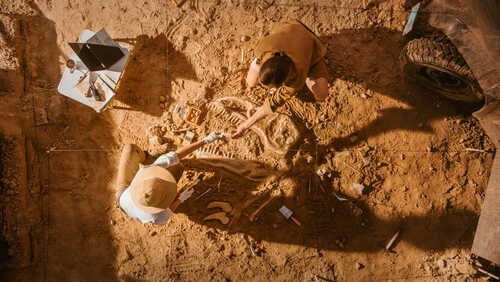
A newly discovered megaraptor skeleton with a crocodile ancestor in its jaws has sparked intrigue and debate among paleontologists.
Story Snapshot
- Joaquinraptor, a new species of Megaraptor, was found with a bone from a crocodile ancestor in its mouth.
- This discovery is the most complete megaraptor skeleton unearthed.
- The raptor hadn’t reached full maturity, raising questions about its development.
- Debate continues on whether the raptor died during a struggle over territory or prey.
Joaquinraptor: A New Species Discovery
In a groundbreaking discovery, paleontologists have unearthed the skeleton of a previously unknown megaraptor species, named Joaquinraptor. This remarkable find includes a leg bone from a crocodyliform, a crocodile ancestor, wedged in its jaws.
The completeness of the skeleton offers unprecedented insights into the anatomy and lifestyle of these prehistoric predators.
Despite its completeness, the skeleton reveals that the Joaquinraptor had not yet reached its full size. This discovery prompts further investigation into the growth patterns and development stages of megaraptors, which have long intrigued scientists. Their predatory prowess and adaptation strategies remain a subject of extensive study.
Intriguing Death Circumstances
The presence of the crocodyliform bone in the raptor’s mouth opens a plethora of questions about the circumstances of its death. Was it a fatal encounter over territory or prey? Or did the raptor perish while consuming its meal?
These questions highlight the complex interactions and survival dynamics of ancient ecosystems, offering a snapshot of life millions of years ago.
While the exact scenario remains speculative, this find contributes to our understanding of predator-prey relationships in the age of dinosaurs. Such interactions are crucial for reconstructing the ecological frameworks that supported diverse life forms during that era.
Implications for Paleontology
This discovery underscores the importance of fossil records in piecing together Earth’s ancient history. The Joaquinraptor find is a reminder of the intricate web of life that existed long before humans.
It challenges scientists to continue exploring and interpreting these ancient clues to gain a clearer picture of evolutionary processes.
The debate surrounding the Joaquinraptor’s death also reflects broader questions in paleontology about how species interacted and evolved. Each new find adds a layer of complexity to our understanding, pushing the boundaries of what we know about prehistoric life.



















